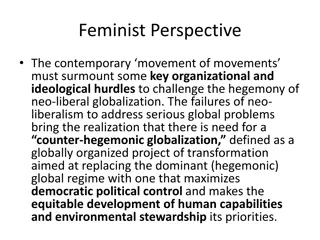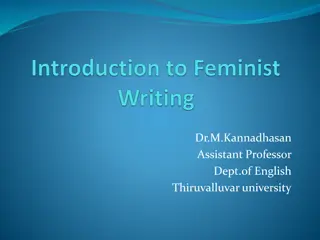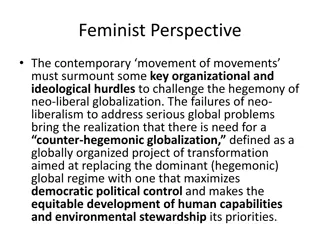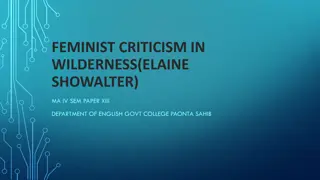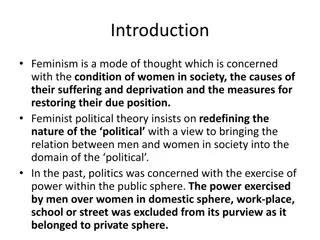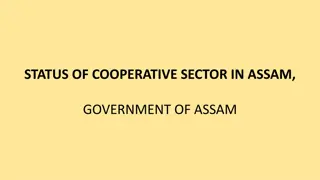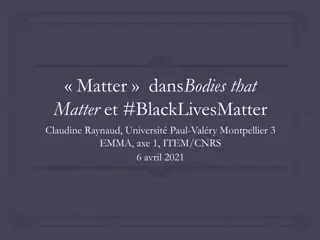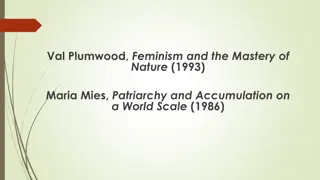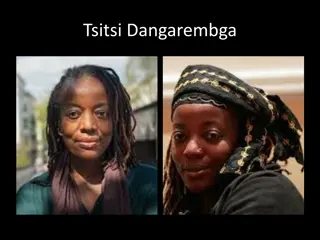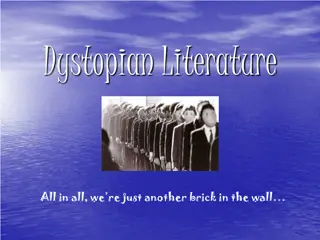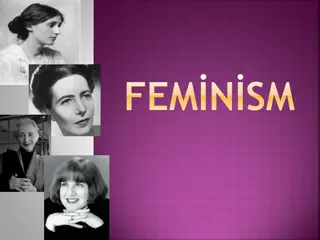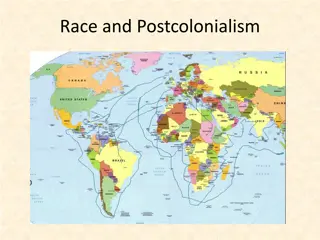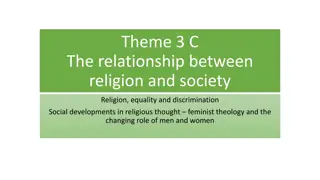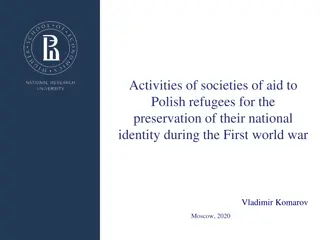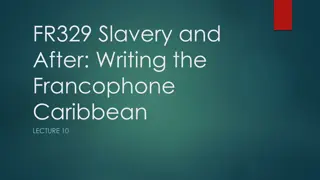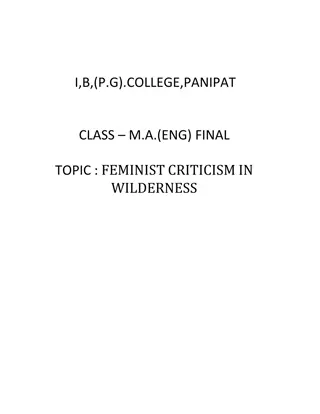Exploring Postcolonial Feminist Literature in Former Colonized Societies
Postcolonial feminist literature emerged in response to the Eurocentric focus of feminism, highlighting the impact of racism and colonialism on non-Western women's experiences. Postcolonial societies navigate shifts in gender roles post-colonization, facing challenges of identity, double consciousness, and imposition of Western ideals.
Download Presentation

Please find below an Image/Link to download the presentation.
The content on the website is provided AS IS for your information and personal use only. It may not be sold, licensed, or shared on other websites without obtaining consent from the author. Download presentation by click this link. If you encounter any issues during the download, it is possible that the publisher has removed the file from their server.
E N D
Presentation Transcript
POSTCOLONIAL LITERATURE1 Postcolonial literature is the literature by people from formerly colonized countries. Postcolonial literature often consequences of the decolonization of a country, especially questions relating to the political and cultural independence of formerly subjugated people, and themes such as racialism and colonialism. Postcolonial feminist literature: Postcolonial feminism emerged as a response to the Eurocentric focus of feminism. It accounts for the way that racism and the long-lasting political, economic, and cultural effects of colonialism affect non-white, non-Western women in the postcolonial world is a form of feminism that developed as a response to feminism focusing solely on the experiences of women in Western cultures. Postcolonial feminism originated in the 1980s as a critique of feminist theorists in developed countries pointing out mainstream feminist ideas and argues that women living in non-Western countries are misrepresented. addresses the problems and the universalizing tendencies of
POSTCOLONIAL LITERATURE 2 The subject of gender is an important part in the study of postcolonial societies. Post-colonial societies are the battlefields for the struggle for identity after the culmination of the imperialistic colonial institution interconnectedness of gender and culture and how identity informs the course of gender roles. The drastic shift of gender roles was first recorded with the inception of colonialism in Africa as women began to reclaim a voice in society by moving from the domestic space to the public workforce and thus defied (challenged) cultural norms. However the issue of identity is engraved with a violent and chaotic process in the wake of the double consciousness that haunts the postcolonial societies. how women are doubly oppressed by both patriarchy and an imperialist hegemony (dominance) and how Western feminist ideals impart a false awareness in the woman s quest for identity in postcolonial society
POSTCOLONIAL LITERATURE 3 As a former British colony, Zimbabwe has been subject to cultural invasion through the institution of colonialism. As such, the Zimbabwean society has experienced changes in gendered norms and values proving that as a social construct, gender is subject to change .The effects of colonialism and cultural imperialism have affected society s life styles and, as a result of this, both women and men have been forced to redefine some important aspects of their identities as well as come to terms with losing some of their traditional gender roles. Given the alienation and double consciousness that distinguish postcolonial societies, this process of gender roles is often mingled with false consciousness. In their postcoloniality, the colonized are still under the miasma of Western imperialist culture and therefore have limited access to their culture such that this process is marked by both psychological and physical violence. with the advent (coming) of colonialism and cultural imperialism, there was a drastic shuffle on the African traditional system which had to come to terms with the dominance and intrusion of a new social setting. The colonizers were able to control and impose their Western knowledge systems and culture on the Africans such that their perceptions of the world became the enacted cultural norms. Through such a development, it can be established how gender roles are created upon the notion that where two comparable entities exist, the stronger entity becomes the dominator and the weaker becomes the dominated. Consequently, the men who were once the symbol of African authority were reduced to laborers and slaves of the colonialists. restructuring
TSITSI DANGAREMBAGAS NERVOUS CONDITIONS 4 Post independent Zimbabwe still carried the legacy of colonialism and as society attempted to reconcile with their traditional culture and restore the values that had been in existence in the period before colonialism, gender roles continued to take on different turns. Cultural norms had been modified during the course of the one hundred years experience of colonization. Men s societal status as the stronger and more dominant sex had been contested in the wake of a new societal order. Having noted that both men and women s traditional roles were lost with the inception of colonialism, it can be noted that women on the other hand began to move from the traditional private spaces into the public workforce. Women began to challenge phallocentric ideals of culture such that even as men aimed to perpetuate women subjugation through merging Western hegemony and patriarchy, women adopted counter measures to end this subjugation. As a result of the continued war of the sexes, African women exclaimed the entrance of the feminist movement in Africa.
TSITSI DANGAREMBAGAS NERVOUS CONDITIONS 5 The battle of gender roles and identities has come a long way holds the capacity to mirror society. encounter in Zimbabwe exposes how men remain the most dominant figures in the field and how they have perpetuated the marginalization of women in Zimbabwean literature. Zimbabwean women therefore in their narratives challenge traditional phallocentric stereotypes of women by men. However it is imperative to note that postcolonial society is haunted by the fact of double consciousness and the degree to which Western feminist advances influenced women s movement for emancipation is the resultant cause of the violence and false consciousness that hinder Zimbabwean women s access to their emancipation. Hence their failure to create a progressive society with complimentary gender roles. Literature An examination of the first literary
TSITSI DANGAREMBAGAS NERVOUS CONDITIONS 6 Nervous Conditions (1988) in terms of the intertexual relation in the depiction of gender roles in postcolonial Zimbabwean society. The text manages to capture how postcolonial women are affected by the violence and chaos of their postcolonial status in their plight liberation. Most female critics in Zimbabwe have tended to adopt mainstream feminism in their awareness of women and as a result, it is important to examine the applicability of feminism as a western concept in a culture which is in a continuous struggle to regain its identity. It asserts that inversion of the oppressive system when women adopt radical ideals to in their plight for emancipation reestablishes the oppressive structure of binary oppositions that characterize colonial society. It aims to bring out the fact that the responsible for the violent manifestations of gender roles is as a result of adopting Western feminist consciousness which does not apply to the construction of a progressive gendered .
NERVOUS CONDITIONS / THEMES 7 Gender Inequality Tambu was born a girl and thus faces a fundamental disadvantage, since traditional African social practice dictates that the oldest male child is deemed the future head of the family. All of the family s resources are poured into developing his abilities and preparing him to lead and provide for his clan. When Nhamo dies, the tragedy is all the more profound since no boy exists to take his place. Tambu steps into the role of future provider, yet she is saddled with the prejudices and limitations that shackled most African girls of her generation. Her fight for an education and a better life is compounded by her gender. Gender inequality and sexual discrimination form the backdrop of all of the female characters lives. In the novel, inequality is as infectious as disease, a crippling attitude that kills ambition, crushes women s spirits, and discourages them from supporting and rallying future generations and other female relatives.
NERVOUS CONDITIONS / THEMES 8 The Influence of Colonialism The essential action of the novel involves Tambu s experiences in a Western-style educational setting, and the mission school both provides and represents privileged opportunity and enlightenment. Despite Ma Shingayi s strong objections, Tambu knows the only hope she has of lifting her family out of poverty lies in education. However, the mission school poses threats, as well: Western institutions and systems of thought may cruelly and irreversibly alter native Africans who are subjected to them. Nyasha, who has seen firsthand the effect of being immersed in a foreign culture, grows suspicious of an unquestioning acceptance of colonialism s benefits. She fears that the dominating culture may eventually stifle, limit, or eliminate the long- established native culture of Rhodesia in other words, she fears that colonialism may force assimilation. The characters lives are already entrenched in a national identity that reflects a synthesis of African and colonialist elements. The characters struggle to confront and integrate the various social and political influences that shape their lives forms the backbone and central conflict of Nervous Conditions.
NERVOUS CONDITIONS / THEMES 9 Tradition vs. Progress Underpinning Nervous Conditions are conflicts between those characters who endorse traditional ways and those who look to Western or so-called modern answers to problems noncommittal in her portrayal of the divergent belief systems of Babamukuru and his brother Jeremiah, and she shows both men behaving rather irrationally. Jeremiah foolishly endorses a shaman s ritual cleansing of the homestead, while Babamukuru s belief in a Christian ceremony seems to be rooted in his rigid and unyielding confidence that he is always right. As Tambu becomes more fixed and established in her life at the mission school, she begins to embrace attitudes and beliefs different from those of her parents and her traditional upbringing. Nyasha, ever the voice of reasonable dissent, warns Tambu that a wholesale acceptance of supposedly progressive ideas represents a dangerous departure and too radical of a break with the past. they face. Dangarembga remains


